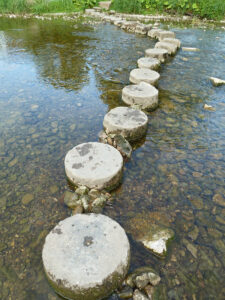Heather Hind is a Lecturer in English Literature with research interests in Victorian literature and material culture. She is currently turning her PhD thesis into a monograph. In this post, the second in our series on the PhD and beyond, she shares her hints and tips for getting started with this process.
Motivation

“Steppingstones across the River Aire, Gargrave” by Tim Green aka atoach is licensed under CC BY 2.0.
Why do you want to publish a book? And how, in broad terms, do you want to go about it? These questions are worth asking yourself early on. Perhaps you see a monograph as a steppingstone in an academic career. Or maybe you want to disseminate your research to a wider audience. Or publication might be a personal goal. Quite likely, your reasoning is a combination of all of these and more.
There are alternatives to the book route, such as publishing your research via academic journals or public-facing media outlets. In any case, practical life matters need to be factored in too. The post-PhD period can be tricky in terms of employment, access to resources and mentoring, and time.Even if you plan to lightly edit your thesis, the timeline from writing your proposal through to seeing your book being published can be surprisingly lengthy – not to mention busy and uncertain.
My best advice is to keep in mind a clear sense of your motivation for publishing your book, and to create a realistic editing schedule. For me, that has meant being more ambitious than I initially intended with my revisions (because my motivation is academic impact) and assigning plenty of time to do them (acknowledging that I have other demands on my time).
Proposal
The next step, after deciding to publish your book, is to get a proposal and sample chapters in order. I’d highly recommend checking out Laura Portwood-Stacer’s Manuscript Works Archive. Laura is the author of The Book Proposal Book and her website contains guidelines, templates, prompts and all kinds of proposal-writing information.
The broad questions I found useful to think about while writing my proposal, and working out the new shape and emphasis of my monograph, were:
- What new perspective/s will my book offer?
- What ideas does it connect, or what story does it tell?
- How might it inform and influence my field and discipline?
Initial edit
First, remove any thesis-y phrasing and heavy-handed signposting, such as ‘In this thesis…’. Next, revise or cull your footnotes and any extraneous references. One of my PhD supervisors advised me to ‘wear my learning heavily’ in the thesis or, in other words, include plenty of references to show the full breadth and depth of my reading and research. While your monograph should be detailed and well-researched, it doesn’t want quite the same ‘heaviness’ as a thesis. During this initial edit, pay extra attention to the clarity of your writing and flow of your argument. As with your footnotes and references, consider cutting any tangential sentences or paragraphs. It’s a good idea to make space for new material before it’s written, rather than adding and adding to an increasingly baggy monster of a manuscript.
Content and structure

“Hot Air Balloon Inflating” by ajagendorf25 is licensed under CC BY-NC 2.0.
Next, you might rethink your monograph’s overall content and structure. Your examiners’ reports can be very useful here! You may well plan to cut as well as add material, though identifying areas to expand—whether to include unused thesis research or new post-PhD developments—can make for a major selling point in a book proposal. I have heard that some publishers want to see an entirely new chapter for the monograph, though another approach (which I’ve adopted) is to add sections of new material to your existing chapters.
You might also consider restructuring your chapters so that they make more sense (or are more marketable) as a book. For example: would splitting your chapters up into shorter ones help to guide your reader through the material with more ease? Is there a current or emerging topic that you might engage with in a new chapter or sub-section? Can you retitle your chapters (or overall book) to appeal to a wider audience?
With these points in mind, I found it helpful to reread some monographs that I admire to reflect on what works well, especially in terms of structuring the introduction and conclusion.
Academic writing guides
These can also be sources of inspiration. Helen Sword’s books on academic writing are excellent and she also has some free writing tools and videos. Here are two more resources I’ve found helpful for writing and editing:
The Thesis Whisperer – This site is useful for thesis writing pointers as well as general academic writing tips.
Publish Not Perish / Jenn McClearen – A newsletter with a back catalogue of posts that includes tips on all aspects of academic writing.
Valuable tips
Picking up on my earlier point about recognising the pressures of the post-PhD period, here’s the advice I’ve found most helpful.
- Carve out writing and editing time

“Mechanical Clock 9 – by Eric Freitas” by Kotomi_ is licensed under CC BY-NC 2.0.
I have found online writing retreats vital to gaining momentum with my editing because they force me to sit down, focus, and work in regular blocks. I even volunteered to run a series of them to squeeze more into my calendar. Even if you don’t join a writing group, you could try marking out blocks of writing and editing time in your calendar as well as planned deadlines for chapters or sub-chapters (which work even better if you tell someone about them for accountability!).
- Look into post-PhD funding and other kinds of support
While there are major postdoctoral funders that provide longer-term fellowships (e.g. Leverhulme, British Academy), these almost exclusively require you to start work on a new project. However, your period or discipline may have societies or associations that provide small pots of research funding to early career academics for developing existing projects or publications (e.g. the Royal Historical Society). Some will cover expenses for research trips (ideal if needed for expanding your monograph), while others may fund proposal writing or even monograph editing. Some have early career memberships and fellowships that provide other benefits to recent PhD graduates, such as academic affiliation, library access, or networking and mentoring opportunities.
- Keep connected to others
I’ve found academic and peer networks in the form of writing groups, societies, conferences, and PhD/Early Career Researcher friends even more important in the post PhD-period. Whether it’s through presenting and getting feedback on your research, swapping proposals or chapter drafts with someone, or just venting about how it’s all going, don’t underestimate the value of sharing your work-in-progress with others.
Heather Hind’s monograph will be the first book-length study of Victorian hairwork – the crafting of decorative objects from human hair – and its presence in British literature of the period, with chapters that focus on works by Charlotte and Emily Brontë, Wilkie Collins, and Margaret Oliphant. Her broader interests are in nineteenth-century literature, material culture, textiles and handicrafts, and object-led and embodied methodologies.

